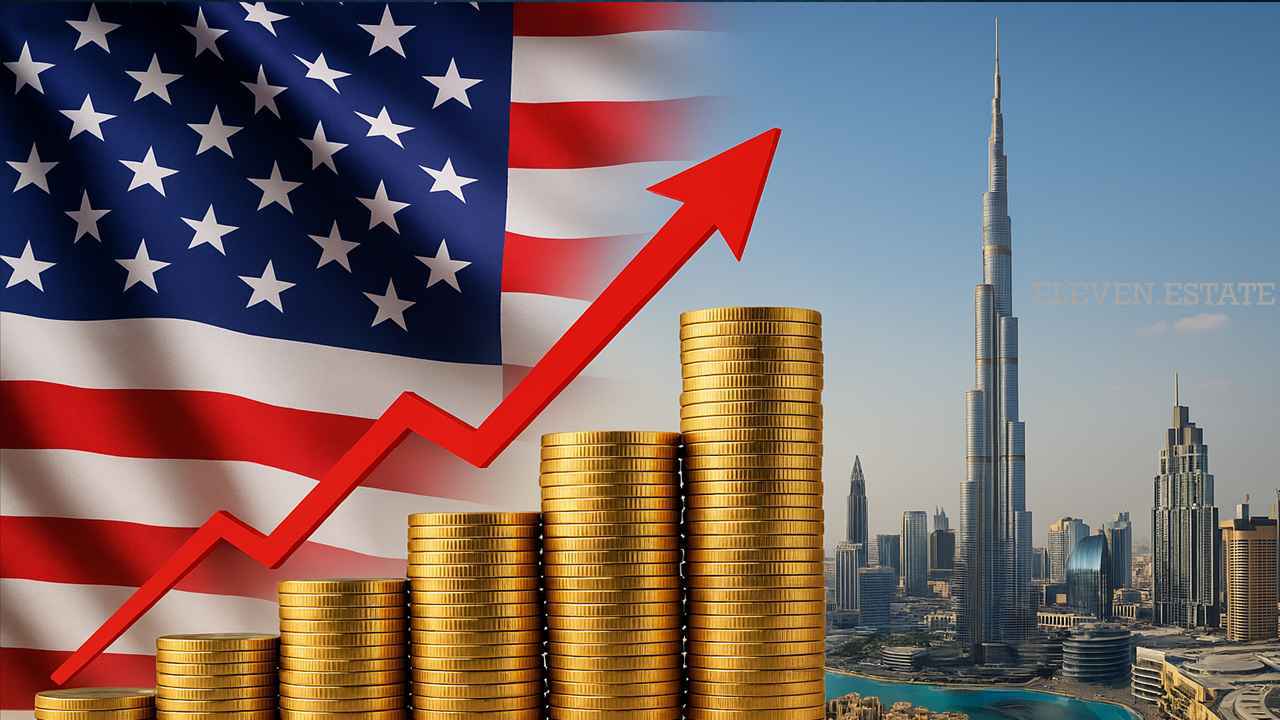Introduction
The recent surge in U.S. tariffs on imports from various countries, including China, the European Union, and key Asian economies, has had significant consequences for global trade and investment flows. While these protectionist measures aim to bolster the American economy, they have created uncertainty and volatility in international markets. Interestingly, one of the regions benefiting from these developments is Dubai, particularly its real estate sector. This article explores how U.S. tariff policies are indirectly fueling the demand for property in Dubai, and why investors are increasingly turning to the emirate as a secure and lucrative alternative

Global Investment Disruption Triggered by U.S. Tariff Policies
When the United States imposes higher tariffs on imports, it disrupts traditional trade relationships and raises operational costs for foreign businesses. As exporters to the U.S. lose competitiveness due to increased expenses, profits shrink, investor confidence wanes, and capital starts flowing out of affected economies
For international investors seeking stability and returns, these conditions encourage asset diversification. Amid this uncertainty, Dubai emerges as a preferred destination due to its strong economic fundamentals and global connectivity. The search for less volatile, regulation-friendly, and tax-efficient environments propels capital toward real estate markets like Dubai’s
Dubai’s Strategic Positioning as a Safe Investment Haven
Dubai has long cultivated its reputation as a global business hub and investment-friendly environment. Several factors make the city attractive to global investors
Tax Advantages: No personal income tax and minimal corporate tax structures
Political and Economic Stability: The UAE boasts strong governance and a resilient economy
Advanced Infrastructure: World-class transport, telecom, and utilities make Dubai globally accessible
Ease of Doing Business: Streamlined regulations and pro-investor policies simplify operations
As global tensions rise, Dubai’s neutrality and openness attract investors fleeing uncertainty in tariff-affected regions. Real estate, in particular, benefits from this trend due to its ability to store value and provide rental income
Ripple Effects on the Dubai Real Estate Sector
The capital inflows resulting from global economic instability have tangible effects on Dubai’s property market
Rising Demand for Residential and Commercial Property: Foreign businesses relocating regional offices, and high-net-worth individuals seeking second homes, drive demand upward
Increased Property Prices in Key Areas: Prime locations such as Downtown Dubai, Business Bay, and Dubai Marina have witnessed heightened interest, pushing prices and competition higher
Rental Market Growth: With an influx of foreign talent and expatriate professionals, the rental market has seen significant expansion across both residential and office segments
Off-plan Investments Surge: Developers have launched a variety of new projects targeting overseas buyers, particularly those from Asia and Europe
seeking to diversify holdings
Government Policies Supporting Real Estate Growth
The Dubai government has been proactive in crafting policies that foster a dynamic and investor-friendly real estate environment. Notable initiatives include
Golden Visa Program: Long-term residency for investors, entrepreneurs, and skilled professionals, encouraging long-term financial commitments
Full Foreign Ownership in Select Sectors: Allowing 100% ownership outside of free zones has significantly boosted foreign interest
Digital Land Registry & Smart Transactions: Ensuring transparency and speed in property transactions to enhance investor confidence
These strategic reforms, combined with global economic shifts, have cemented Dubai’s appeal as a resilient real estate hub
Case Examples and Investment Trends
Recent market data suggests increased activity from countries directly affected by U.S. tariffs. For example
Chinese Investors: Faced with increasing pressure from the U.S.-China trade war, many Chinese investors are purchasing property in Dubai as a safe asset
European Corporations: Uncertainty around EU-U.S. trade relations has prompted businesses to set up offices in Dubai, fueling demand for commercial space
South Asian and Southeast Asian Investors: With supply chains disrupted, investors from these regions are hedging by diversifying into real estate in Dubai
This trend is further reinforced by global inflation concerns and weakening currencies, making Dubai’s property market relatively affordable and attractive
Future Outlook
If U.S. tariff policies persist or expand, Dubai stands to benefit further. The city’s ability to adapt to global economic trends and offer a stable environment gives it a strategic edge
Moreover, with major infrastructure projects underway, such as new transport networks, tourism initiatives, and Expo legacy developments, the city is preparing for sustained growth in the property sector
Conclusion
U.S. tariff increases, though designed to protect domestic industry, are inadvertently accelerating investment in international markets—most notably in Dubai’s real estate sector. The emirate’s strategic advantages, policy flexibility, and proactive development plans make it a magnet for investors seeking both stability and growth
As global trade tensions evolve, Dubai’s real estate market is likely to continue its upward trajectory, offering substantial opportunities for long-term investors. For those looking to diversify in uncertain times, Dubai real estate presents a compelling case






